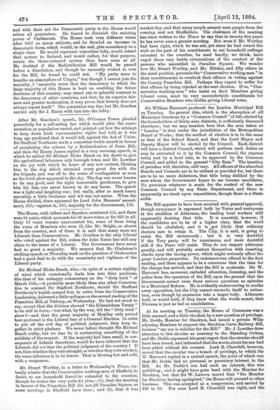The Bill appears to have been received with general approval,.
though annoyance is expressed both by Tories and vestrymen at the abolition of Aldermen, the leading local workers still apparently desiring that title. It is essential, however, if the candidates are to be of a higher class, that the word should be abolished, and it is ...not likely that ordinary electors care to retain it. The U.iy, it is said, is going to, resist the Bill strenuously ; but it is very doubtful if the Tory party will be unanimous, and more doubtful still if the Peers will resist. They. do not respect aldermen greatly, and will probably content themselves with inserting checks upon the taxing power, which might seriously affect the great London properties. No resistance was offered to the first reading, and there appears to be a consensus that the time for- the change has arrived, and that the Bill is moderate. Sir W. Harcourt has, moreover, excluded education, licensing, and the police from the operation of the Bill, upon the ground that the Government cannot raise those serious questions as episodes in a Municipal Reform. He is evidently endeavouring to soothe away opposition, but the City cannot reconcile itself to extinc- tion, even though by expansion into a larger body. Aldermen hold, or would hold, if they knew what the words meant, that Nirvana is just as bad as annihilation.


































 Previous page
Previous page